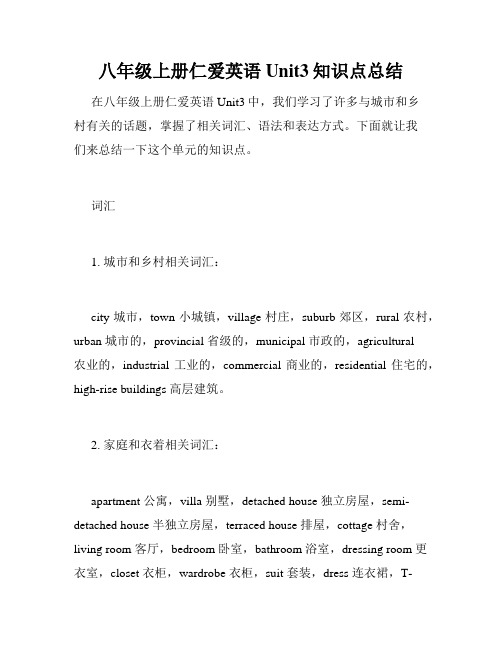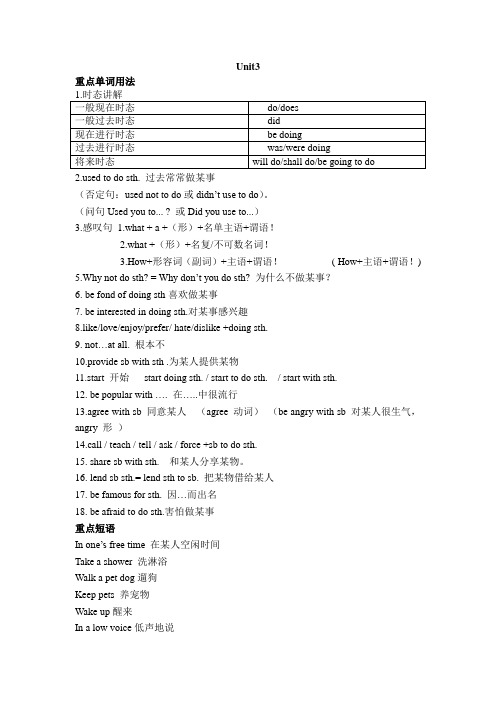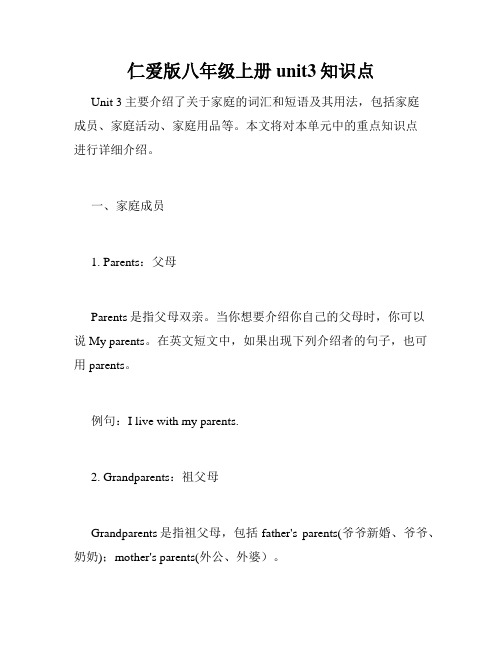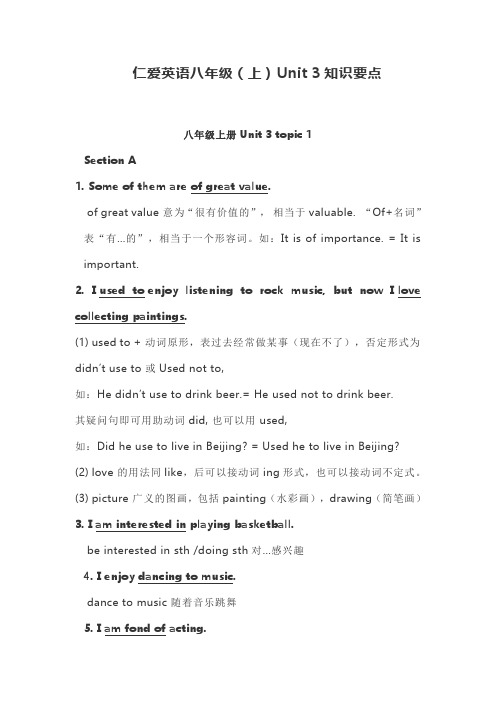2013版仁爱英语八年级上册期末语法总复习unit3andu
仁爱英语八年级上册Unit3知识点

仁爱英语八年级上册Unit3知识点本文将详细介绍仁爱英语八年级上册Unit3的知识点,包括重要的单词、表达方式以及语法结构等。
帮助学生更好地掌握此单元的知识,顺利完成学习任务。
一、重要单词1. grade 年级2. schedule 时间表3. term 学期4. memorize 记忆5. revise 复习6. grab 抓住7. cheat 作弊8. summarize 总结9. assignment 作业10. participate 参加二、表达方式1.询问日程安排What’s your schedule like tomorrow?明天你的日程安排怎么样?2. 描述个人喜好及习惯I like studying English every morning.我喜欢每天早上学习英语。
3. 表达自己的看法In my opinion, English is not too difficult.在我看来,英语并不是太难。
4. 建议You should practice speaking English more often.你应该经常练习说英语。
5. 感叹What a difficult test it is!真是一张难题卷!三、语法结构1. 现在进行时现在进行时表示正在进行的动作或状态,常与now、at the moment连用。
例如:I’m doing my homework now.我正在做作业。
2. 过去完成时过去完成时表示过去某一时刻或动作之前完成的动作。
例如:By the time the party began, I had finished my work.派对开始时,我已经完成了自己的工作。
3. 定语从句定语从句用来修饰名词或代词,常用关系代词who、whom、that、which引导。
例如:The girl who is sitting next to me is my sister.坐在我旁边的女孩是我妹妹。
仁爱英语八年级上册Unit3-topic2知识点总结

Unit3 Our HobbiesTopic2 What sweet music!一、重点短语continue doing sth. 继续做某事 be born 出生set up 建立classical music 古典音乐folk songs 民歌stage name 艺名everyday life 日常生活be famous for 因……而著名look for 寻找二、重点句型1. And it sounds great! 听起来好极了。
2. What kind of musical instrument can you play? 你会弹什么种类的乐器?3. We have guitar, violin, piano and drum lessons for just ¥240 each. 我们有吉他课、小提琴课、钢琴课、和打鼓课,每个课程仅需要240元。
4. What do you do in your free time? 你在闲暇之际干些什么?5. Classical music is serious music. 古典音乐是一种很严肃的音乐。
6. Pop music often comes and goes easily. 流行音乐来得快去得也快。
7. They are very popular among young people. 它们在年轻人当中很流行。
8. Guo Lanying, Song Zuying and Tenger are famous for their folk songs. 郭兰英,宋祖英和腾格尔以(唱)民歌而出名。
9. It is one of the most famous rock bands in the world. 它是世界上最著名的摇滚乐队之一。
10. In the fall of 1976, a 14-year-old high school student, Larry Mullen, looked for some musicians. 在1976年的秋天,一个14岁的中学生,Larry Mullen寻找一些音乐家。
仁爱英语八年级上册u3t3知识点

仁爱英语八年级上册u3t3知识点仁爱英语八年级上册第三单元第三课的知识点主要集中在三个方面,即时态的运用、被动语态的使用以及省略语的应用。
以下将会详细讲解这些知识点的使用方法和注意事项。
一、时态的运用时态在英语语法中是一个很重要的概念,它直接关系到句子中所表达的动作发生的时间和状态。
在英语中,常用的时态有六种,分别为一般现在时、一般过去时、一般将来时、现在进行时、过去进行时和将来进行时。
这些时态的运用不同,需要根据句子所描述的情况来确定使用哪种时态。
1.一般现在时使用形式:主语 + 动词原形(s/es)+ 其他。
例如:I go to school every day.注意:一般现在时用来表达的是经常性、习惯性的动作和现在的状态。
2.一般过去时使用形式:主语 + 动词过去式 + 其他。
例如:She went to the park yesterday.注意:一般过去时用来表达发生在过去的动作或状态。
3.一般将来时使用形式:主语 + will/shall + 动词原形 + 其他。
例如:He will go to Beijing tomorrow.注意:一般将来时用来表达将要发生的动作或事件。
4.现在进行时使用形式:主语 + be动词+ 现在分词 + 其他。
例如:I am swimming in the pool.注意:现在进行时用来表达现在正在发生的动作。
5.过去进行时使用形式:主语 + was/were + 现在分词 + 其他。
例如:He was playing the piano when I came in.注意:过去进行时用来表达过去某一时刻正在发生的动作。
6.将来进行时使用形式:主语 + will be + 现在分词 + 其他。
例如:They will be watching TV at 8:00 pm tomorrow.注意:将来进行时用来表达将来某一时刻正在进行的动作。
二、被动语态的使用被动语态是指由及物动词的宾语变为主语而构成的语态。
八年级上册仁爱英语Unit3知识点总结

八年级上册仁爱英语Unit3知识点总结在八年级上册仁爱英语Unit3中,我们学习了许多与城市和乡村有关的话题,掌握了相关词汇、语法和表达方式。
下面就让我们来总结一下这个单元的知识点。
词汇1. 城市和乡村相关词汇:city 城市,town 小城镇,village 村庄,suburb 郊区,rural 农村,urban 城市的,provincial 省级的,municipal 市政的,agricultural农业的,industrial 工业的,commercial 商业的,residential 住宅的,high-rise buildings 高层建筑。
2. 家庭和衣着相关词汇:apartment 公寓,villa 别墅,detached house 独立房屋,semi-detached house 半独立房屋,terraced house 排屋,cottage 村舍,living room 客厅,bedroom 卧室,bathroom 浴室,dressing room 更衣室,closet 衣柜,wardrobe 衣柜,suit 套装,dress 连衣裙,T-shirt T恤衫,trousers 长裤,jeans 牛仔裤,skirt 裙子,jacket 夹克,coat 大衣。
3. 时间和工作相关词汇:weekdays 工作日,weekends 周末,Monday 星期一,Tuesday星期二,Wednesday 星期三,Thursday 星期四,Friday 星期五,Saturday 星期六,Sunday 星期日,morning 上午,afternoon 下午,evening 晚上,night 夜晚,office 办公室,factory 工厂,mining 矿业,farming 农业,medicine 医学,business 商业。
语法1. 现在进行时现在进行时表示正在进行的动作,由“be动词+动词的现在分词”构成,结构为:主语+am/is/are(be动词)+动词的现在分词。
仁爱英语八上期末复习unit3资料

仁爱教材八上复习资料Unit 3 Our HobbiesTopic 1 What hobbies did you use to have?1.in one’s spare time = in one’s free time在某人的空闲时间里例:I play basketball in my spare time.我在空闲时间打篮球。
2.why not表示为什么不,后接动词原形,表示建议。
例:Why not go out for a walk?为什么不出去散步呢?表示建议的还有以下句型:What / How about…?后接v-ing例:What about going swimming? = How about going swimming?去游泳怎么样?3.You’d better (not) do sth.你最好(不)要干某事例:You’d better give up smoking.你最好戒烟。
You’d better not play football in the street.你最好不要在街上踢足球。
4.change作名词意为“改变,变化,转变,零钱”例:a great change巨大的变化Here’s your change.找您零钱。
作动词时是“改变,变革,交换,替换”等意思例:change one’s mind改变主意change one’s clothes换衣服5.be interested in…对…感兴趣,后接名词、代词和动名词例:He is interested in fishing.他对钓鱼感兴趣。
注意:interested其主语一般是人,说明人“对…感兴趣”,一般只作表语,不作定语;interesting用于说明人事物本身“有趣,有意义”,在句中既作定语,也可作表语。
例:That is an interesting book. We are all interested in it.那是一本有趣的书,我们都对它感兴趣。
仁爱英语八年级上册unit 3知识点归纳

Unit3重点单词用法ed to do sth. 过去常常做某事(否定句:used not to do或didn’t use to do)。
(问句Used you to... ? 或Did you use to...)3.感叹句1.what + a +(形)+名单主语+谓语!2.what +(形)+名复/不可数名词!3.How+形容词(副词)+主语+谓语!( How+主语+谓语!)5.Why not do sth? = Why don’t you do sth? 为什么不做某事?6. be fond of doing sth喜欢做某事7. be interested in doing sth.对某事感兴趣8.like/love/enjoy/prefer/ hate/dislike +doing sth.9. not…at all.根本不10.provide sb with sth .为某人提供某物11.start 开始start doing sth. / start to do sth. / start with sth.12. be popular with …. 在…..中很流行13.agree with sb 同意某人(agree 动词)(be angry with sb 对某人很生气,angry 形)14.call / teach / tell / ask / force +sb to do sth.15. share sb with sth. 和某人分享某物。
16. lend sb sth.= lend sth to sb. 把某物借给某人17. be famous for sth. 因…而出名18. be afraid to do sth.害怕做某事重点短语In one’s free time 在某人空闲时间Take a shower 洗淋浴Walk a pet dog遛狗Keep pets 养宠物Wake up醒来In a low voice低声地说。
仁爱英语八年级上册Unit3语言知识点

仁爱英语八年级上册Unit3 语言知识点Topic 1 What’s your hobby ?一、重点词汇(一)重点单词hobby poem maybe pet collect plant coin hate pop friendship funny stupidugly background paper scissors glue cut stick lazy passage introductioneveryday snake provide pig dirty(二)重点短语1.in one’ s free time 在空闲时间2.enjoy doing sth. 喜欢做某事love doing sth. 喜欢做某事3. do some outdoor activities 做些户外活动4.change (名词)改变;零钱ed to do sth. 过去常常做某事(现在不做了)6.get started 开始7.It is + adj. (for sb. ) to do sth. (对于……来说),做某事是……8.start with 以……开始9.cut out 剪下,裁剪10.need sth. to do sth. 需要某东西做某事11.share sth. with sb. 与某人分享某东西12.provide sb. with sth. 为某人提供某物= provide sth. for sb.二、重点句型1.I also enjoy reading stories and listening to music. 我也喜欢读故事、听音乐。
2.What’s your hobby? 你的爱好是什么?—I love reciting poems. 我喜欢背诵诗歌。
3.Sounds good! 听起来不错!4.I am interested in…我对……感兴趣。
5.I am fond of …我喜欢……。
仁爱英语八年级上期末复习Unit_3_Our_hobbies(整理版)

Unit 3 Our Hobbies|Topic 1What's your hobby?||| |语法:used to过去常常做某事爱好:go fishing /read stories /listen to music / recite poems /watch movies /play the guitar /walk a pet dog /collect stamps /plant flowers /climb mountains/fly kites/go travel/go swimming/重点句型:(1) I am interested in playing basketball.(2) I love singing and playing the guitar.(3) I enjoy dancing to music.(4) I prefer playing soccer.(5) I am fond of acting.(6) I like reciting poems.Topic 2What sweet music!|语法:感叹句重点词汇:Musical Instruments:piano/violin/erhu/guitar/drumsMusical types:rock/folk/classical/jazz/hip hop/country musicCareer: singer/ composer/musician/violinist重点句型:1)What sweet music!2)What beautiful stamps!3)What a pity!4)It sounds beautiful!5)How exciting!6) They are very popular with young peopleTopic 3What were you doing at this timeyesterday?|语法:was/ were going to do 过去进行时重点短语:wash some clothes/do somecleaning/practice the violin/take a shower重点句型:(1) — What were you doing at this timeyesterday? — I was taking a shower.(2) — Were you playing computer games?— Yes, I was./ No, I wasn’t.(3) — What were you doing from seven tonine yesterday? — I was learning English.(4)—I think classical music is pleasant.(5)— I agree with you/No, I don’t think so. Ithink it’s too serious/ I think it’s just so-so.重点语法*used to 过去经常I used to enjoy pop music, but now I don’t like it.我过去经常喜欢流行音乐,但现在不喜欢。
仁爱英语八年级上Unit3知识点

仁爱英语八年级上Unit3知识点本文将为大家介绍仁爱英语八年级上Unit3的知识点,帮助大家更好地学习和掌握英语知识。
一、动词时态在Unit3中,学生需要掌握几种常见的动词时态,包括一般现在时、一般过去时和一般将来时。
1. 一般现在时一般现在时表示经常性、习惯性的动作或状态。
例如:I usually go to bed at 10 o'clock.常规情况下,动词在第三人称单数形式要加s,例如:He likes playing basketball.2. 一般过去时一般过去时表示过去某个时间发生的动作或状态,例如:We went to the park yesterday.常规情况下,动词要加-ed,例如:He walked to school.不规则动词有特殊的过去式形式,例如:go -> wenteat -> ate3. 一般将来时一般将来时表示将要发生的动作或状态。
例如:I will visit my grandparents next week.常规情况下,将来时需要使用will或shall,例如:She will buy a new dress for the party.二、被动语态被动语态是英语语法中的一个重要部分。
被动语态表示主语是动作的承受者,而不是动作的执行者。
被动语态的构成如下:be + 过去分词例如:The book was written by him.三、形容词和副词的比较级和最高级形容词和副词的比较级和最高级是英语学习中必不可少的部分,也是Unit3的知识点之一。
比较级和最高级的构成如下:1. 形容词和副词的比较级形容词的比较级通常在词尾加-er,例如:She is taller than her sister.副词的比较级通常在词尾加-er,例如:He runs faster than me.2. 形容词和副词的最高级形容词的最高级通常在词尾加-est,例如:The cat is the cutest in the park.副词的最高级通常在词尾加-est,例如:He talks the fastest in the class.四、名词性从句名词性从句是由一个名词性词语引导的从句,可以在句子中作主语、宾语和表语等。
八年级英语上册unit3知识点及练习(仁爱英语)

八年级英语上册unit3知识点及练习(仁爱英语)仁爱英语八年级unit3知识点归纳tpi1hat’surhbb一重点词汇_______爱好_________假期_______绘画__________友谊____________知识______每日的_______是否________例如____________过去常常做某事________洗澡______________对……感兴趣__________跳舞___________划船____________打排球________游泳_________画画___________集邮_____________收藏硬listeningt______/_______usi听流行、古典音乐alingintheuntrside____________二重点句型:!sanstaps!哇,那么多的邮票!本句意为:therearesanstapssan意思是“______”,suh意思也是“______”。
如:)therearesanflersr:sanflers!这里有这么多的花。
2)thereissuhaternthetabler:suhater!桌子上有那么多的水。
2eanlearnaltabutpeple,plaes,histr,andspeialtiesfrst aps通过这些邮票我们可以学到许多关于人文、地理、历史和特殊时代的知识。
alt“许多、大量”,用在动词后,同_________。
如:另外,altf和ltsf的意思也是“许多、大量”,要用在____词前,在肯定句中常代替uh,an。
在口语中尤其如此。
altf和ltsf之间没有多大区别,都可以与可数名词和不可数名词连用。
与不可数名词连用时,动词用____数,与可数名词连用时,动词用______数。
3uldulietlletanfthesethings?你想集下面这些东西吗?ulduliet+动词_______,表示“想要……”4hatthingsdulvelleting?你喜欢集什么东西?lve+______表示“喜欢、爱好”,也可以用________表示。
仁爱版八年级上册unit3知识点

仁爱版八年级上册unit3知识点Unit 3主要介绍了关于家庭的词汇和短语及其用法,包括家庭成员、家庭活动、家庭用品等。
本文将对本单元中的重点知识点进行详细介绍。
一、家庭成员1. Parents:父母Parents是指父母双亲。
当你想要介绍你自己的父母时,你可以说My parents。
在英文短文中,如果出现下列介绍者的句子,也可用parents。
例句:I live with my parents.2. Grandparents:祖父母Grandparents是指祖父母,包括father's parents(爷爷新婚、爷爷、奶奶);mother's parents(外公、外婆)。
例句:I often visit my grandparents.3. Uncle:叔叔/伯伯Uncle可以指叔叔或者伯伯。
在英文中没有明显的区分,只有伯伯(父亲兄弟)、叔叔(父亲弟弟)。
例句:My uncle lives in Canada.4. Aunt:阿姨/伯母Aunt是指阿姨或者伯母,和Uncle一样,并没有明显的区分。
需要根据实际情况进行判断。
例句:My aunt is a teacher.二、家庭活动1. Have a picnic:去野餐Have a picnic是指去外面野餐。
这是一个很好的家庭活动,你可以和家人一起享受阳光和大自然。
例句:We are going to have a picnic this weekend.2. Play board games:玩桌游在家里玩桌游也是一个很好的家庭活动。
这可以增加家庭成员之间的互动,并且在享受游戏的同时,还可以提高智力。
例句:We often play board games on Saturday nights.3. Watch TV:看电视在家里看电视是很多家庭成员都喜欢的活动。
不过需要注意的是,如果看电视时间过长,会影响家庭成员之间的交流。
仁爱英语八年级上册Unit 3 知识要点

仁爱英语八年级(上)Unit 3知识要点八年级上册Unit 3 topic 1Section Aof great value 意为“很有价值的”,相当于valuable. “Of+名词”表“有…的”,相当于一个形容词。
如:It is of importance. = It is important.(1) used to + 动词原形,表过去经常做某事(现在不了),否定形式为didn’t use to 或Used not to,如:He didn’t use to drink beer.= He used not to drink beer.其疑问句即可用助动词did, 也可以用 used,如:Did he use to live in Beijing? = Used he to live in Beijing?(2) love 的用法同like,后可以接动词ing形式,也可以接动词不定式。
(3) picture 广义的图画,包括painting(水彩画),drawing(简笔画)be interested in sth /doing sth对…感兴趣dance to music 随着音乐跳舞be fond of doing sth 喜爱Section BIn one’s spare time = in one’s free time 在某人空闲时间里(1)表建议的句型有:Why not = Why don’t you,后接动词原形,如;Why not/ Why don’t you go out ?What about = How about 后接动词ing,如:What / How about going out ?Shall we + 动词原形,如:Shall we go out ?(2)do some outdoor activities 做户外活动change ①名词,改变,如:a great change。
仁爱英语八上Unit 3复习

中考总复习第一轮八上Unit 3重点短语在某人的业余时间里in one’s free time=in one’s spare time对…感兴趣be interested in (doing sth.)喜欢like=love =be fond of(doing)sth.遛狗 walk a pet dog种花plant flowers像某人学习learn sth. from sb.背诵古诗recite a poem集邮collect stamps过去常常做某事used to do sth.提供给某人某物provide sb.with sth.=provide sth. for sb.洗澡take a bath.去听音乐会go to a concert举办音乐会give a concert在音乐会上at a concert拉小提琴play the violin打鼓play the drums流行音乐pop music民族音乐folk music摇滚乐rock music古典音乐classical music乡村音乐country music在…中受欢迎be popular with因…而著名be famous for请稍等(电话用语)hold the line =hold on=wait a moment=just a minute接电话answer the phone淋浴take a shower同意某人的看法agree with sb.停止正在做的事stop doing sth.停下来去做另一件事stop to do sth.语法重现:used to 用法I used to enjoy listening to rock music . 译:_____________点拨:used to 意为“________”,表示现在已不是那样了,后接_________否定形式为…didn’t use to… (美式) 疑问形式为Did … use to…? (美式)巩固:他过去常常起床很晚。
- 1、下载文档前请自行甄别文档内容的完整性,平台不提供额外的编辑、内容补充、找答案等附加服务。
- 2、"仅部分预览"的文档,不可在线预览部分如存在完整性等问题,可反馈申请退款(可完整预览的文档不适用该条件!)。
- 3、如文档侵犯您的权益,请联系客服反馈,我们会尽快为您处理(人工客服工作时间:9:00-18:30)。
• • • •
2) be used to doing sth.(习惯于做某事 ) He is used to working hard. I am used to getting up early. They are used to playing football in the afternoon.
仁爱英语八年级上册期末语法 总复习
Unit3-unit4
• 1. 1) used to do sth. 这一结构表示过去的习惯(过去经 常反复发生的动作),只有一种形式,即过去式,用于 所有的人称。 • used to 的否定形式为:used not to do 或 didn’t use to do • 疑问句为:Used you to……? 或 Did you use to……? • I used to go to school on foot. • He used to get up late. • I didn’t use to go to school on foot. • = I used not to go to school on foot. • Did you use to go to school on foot. ? • = Used you go to school on foot? • He used not to get up late. • = He didn’t use to get up late. • Did he use to get up late? • = Used he get up late?
• • • • • •
4. be angry with sb. 生某人的气 I am always angry with my students. be angry at sb. 对某人的言行气愤 He was angry at keeping waiting be angry about sth. 对某事生气 They were angry about so much traffic in the street.
• 4) be used for doing sth.(某物被用来做某 事) • Knives are used for cutting. • =Knives are used to cut. • Watch is used for telling the time. • = Watch is used to tell the time.
• • • • • • • •
5. too… to… 太…… 而不能 He is too young to go to school. =He is so young that he can’t go to school. =He isn’t old enough to go to school. She is so clever that she can work it out easily. = She is clever enough to work it out easily. The coat is so cheap that we can buy it. =The coat is cheap enough to buy.
• 3. one of + 最高级 + 名词的复数 • Liu Xiang is one of the fastest runners in the world. • English is one of the most important subjects this term. • Changjiang River is one of the longest rivers in the world. • Miss Liu is one of the most popular teachers in our school.
• • • • •
• • • •
7. I’m quite sure that there are UFOs. be sure + that引导从句,其中that 可以省掉。 I’m sure(that)he will come. We are sure(that)we will win the football match. be not sure + whether/ if 引导从句,意思是“不确信是 否……, 不敢肯定……” I’m sure whether/ if he will come. I’m not sure whether/ if there are UFOs. We are sure whether/ if we will win the football match. I’m not sure whether/ if robots will make humans. be famous for“以…… 而著名, 因…… 而出名” • China is famous for a long history. • Beijing library is famous for having lots of books. • Chongqing is famous for hot pot. • be famous as “作为……而出名” • Zhou Jielun is famous as a singer. • Liu Xiang is famous as a runner.
• • • •
3) be used to do sth.(某物被用来做某事) Wood is used to make paper. = wood is used for making paper. Computer can be used to do a lot of work now. • =Computer can be used for doing a lot of work now.
• 6. think about意思是“ 思考,考虑”,与 “think of”意思相近。 • think of 有“想起,想到,认为”的意思。 • People without a job try not to think of/ think about the future. • What are you thinking about? • She often thinks of her friend Zhao Ke. • What do you think of the film? • = How do you like the film? • think over意思是“仔细考虑”。 • Please think it over, then answer me.
